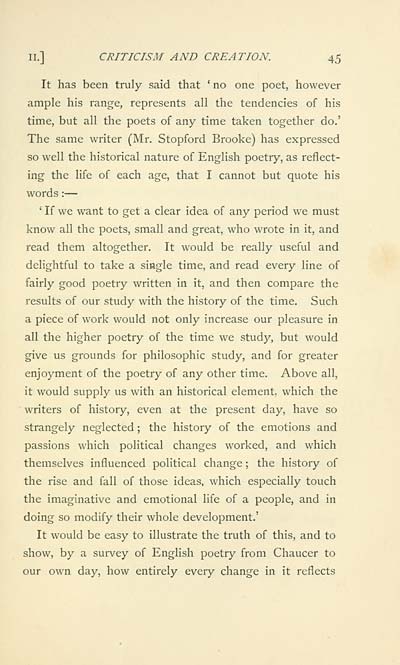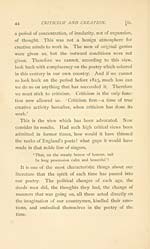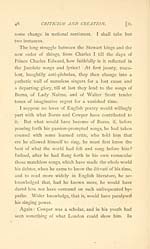Download files
Complete book:
Individual page:
Thumbnail gallery: Grid view | List view

II.] CRITICISM AND CREATION. 45
It has been truly said that ' no one poet, however
ample his range, represents all the tendencies of his
time, but all the poets of any time taken together do.'
The same writer (Mr. Stopford Brooke) has expressed
so well the historical nature of English poetry, as reflect-
ing the life of each age, that I cannot but quote his
words : —
' If we want to get a clear idea of any period we must
know all the poets, small and great, who wrote in it, and
read them altogether. It would be really useful and
delightful to take a siagle time, and read every line of
fairly good poetry written in it, and then compare the
results of our study with the history of the time. Such
a piece of work would not only increase our pleasure in
all the higher poetry of the time we study, but would
give us grounds for philosophic study, and for greater
enjoyment of the poetry of any other time. Above all,
it would supply us with an historical element, which the
writers of history, even at the present day, have so
strangely neglected ; the history of the emotions and
passions which political changes worked, and which
themselves influenced political change ; the history of
the rise and fall of those ideas, which especially touch
the imaginative and emotional life of a people, and in
doing so modify their whole development.'
It would be easy to illustrate the truth of this, and to
show, by a survey of English poetry from Chaucer to
our own day, how entirely every change in it reflects
It has been truly said that ' no one poet, however
ample his range, represents all the tendencies of his
time, but all the poets of any time taken together do.'
The same writer (Mr. Stopford Brooke) has expressed
so well the historical nature of English poetry, as reflect-
ing the life of each age, that I cannot but quote his
words : —
' If we want to get a clear idea of any period we must
know all the poets, small and great, who wrote in it, and
read them altogether. It would be really useful and
delightful to take a siagle time, and read every line of
fairly good poetry written in it, and then compare the
results of our study with the history of the time. Such
a piece of work would not only increase our pleasure in
all the higher poetry of the time we study, but would
give us grounds for philosophic study, and for greater
enjoyment of the poetry of any other time. Above all,
it would supply us with an historical element, which the
writers of history, even at the present day, have so
strangely neglected ; the history of the emotions and
passions which political changes worked, and which
themselves influenced political change ; the history of
the rise and fall of those ideas, which especially touch
the imaginative and emotional life of a people, and in
doing so modify their whole development.'
It would be easy to illustrate the truth of this, and to
show, by a survey of English poetry from Chaucer to
our own day, how entirely every change in it reflects
Set display mode to: Large image | Transcription
Images and transcriptions on this page, including medium image downloads, may be used under the Creative Commons Attribution 4.0 International Licence unless otherwise stated. ![]()
| Early Gaelic Book Collections > Ossian Collection > Aspects of poetry > (61) |
|---|
| Permanent URL | https://digital.nls.uk/78386004 |
|---|
| Description | Selected books from the Ossian Collection of 327 volumes, originally assembled by J. Norman Methven of Perth. Different editions and translations of James MacPherson's epic poem 'Ossian', some with a map of the 'Kingdom of Connor'. Also secondary material relating to Ossianic poetry and the Ossian controversy. |
|---|
| Description | Selected items from five 'Special and Named Printed Collections'. Includes books in Gaelic and other Celtic languages, works about the Gaels, their languages, literature, culture and history. |
|---|

